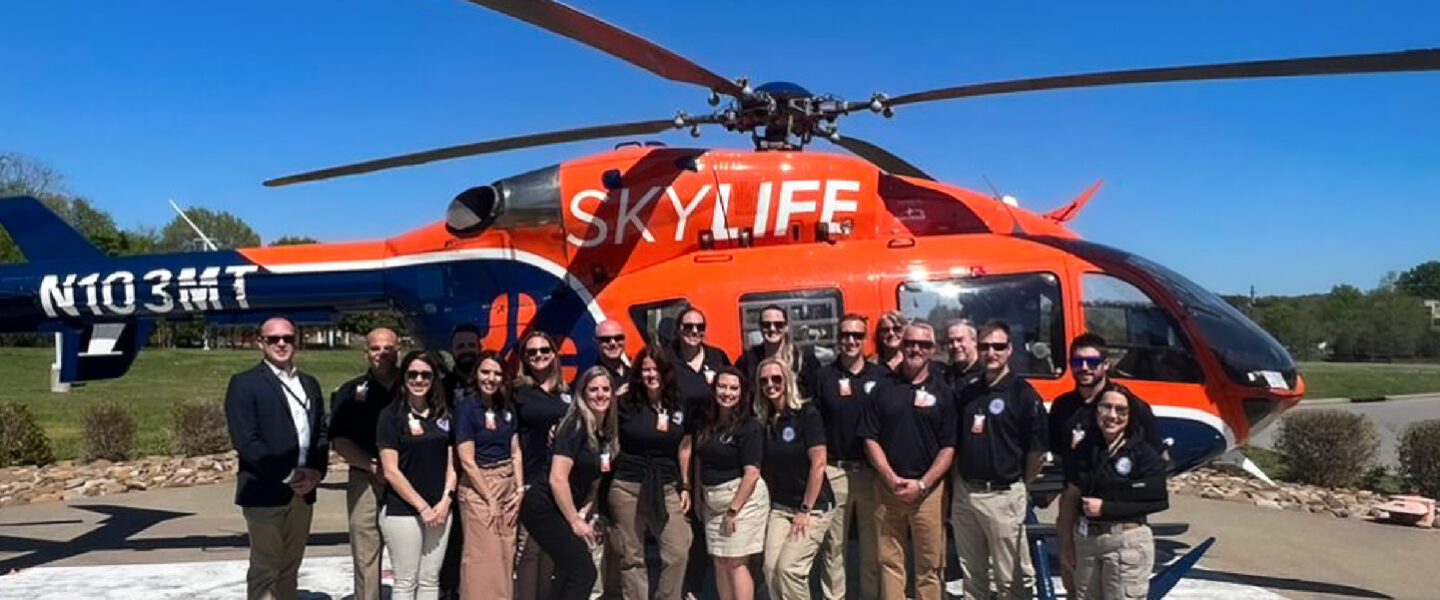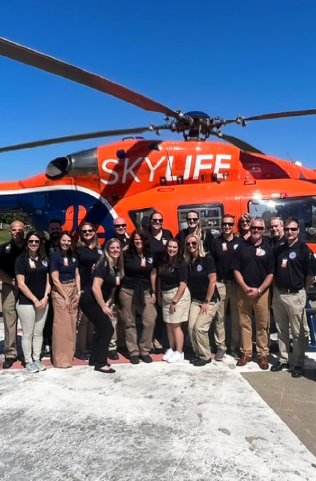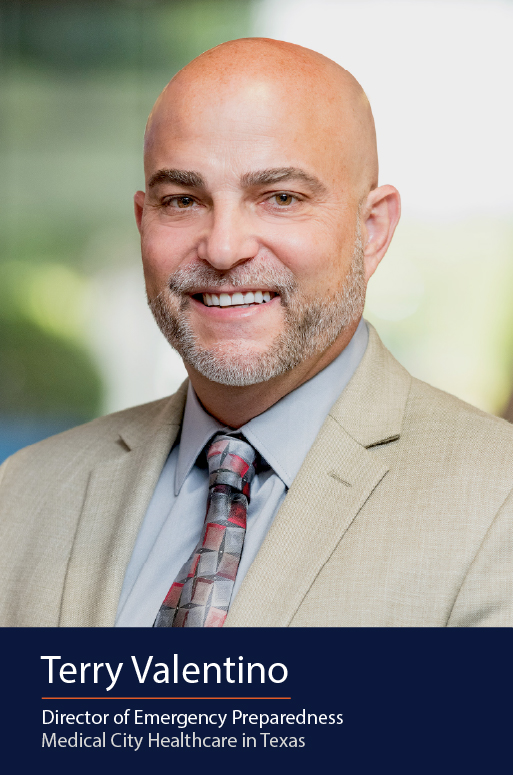A pioneering program for NICU clinical staff and emergency transport teams aims to help them work more seamlessly and collaboratively.


Moving young patients from the neonatal intensive care unit (NICU) can be a complicated proposition. But emergencies, including hurricanes, floods and power outages, can make an already difficult task even more challenging.
When a crisis requires the relocation of NICU patients, two of HCA Healthcare’s most specialized units — the emergency transport team and the NICU clinical staff — spring into action. In 2021, HCA Healthcare began pioneering training programs to ensure that members of both teams work together seamlessly. Since then, two events were organized to help the teams better collaborate when needed:
- HCA Healthcare held its first NICU Incident Support Team (IST) training in August 2022 in Brandon, Florida. Roughly 30 transport and clinical care specialists gathered to prepare for the transfer of NICU patients in the event of an emergency.
- This past spring (2023), more than 130 emergency response and NICU specialists from throughout the enterprise gathered in Nashville, Tennessee, for an Emergency Operations Summit.
“Our biggest concern is the no-notice events — the earthquakes, the wildfires that can pop up on a facility,” says Jessica Picanzo, MSN, EMT-P, CFRN, CMTE, director of Enterprise Emergency Operations and Medical Transport. “It’s extremely important that we have teams like this available and [that they be] on call, essentially 24/7, in the event that we do have a no-notice event [so] we can pull the trigger and get people out there to help.”
The need for that training grew out of risk assessment sessions held in preparation for the 2022 hurricane season.
It’s extremely important that we have teams like this available and [that they be] on call, essentially 24/7, in the event that we do have a no-notice event [so] we can pull the trigger and get people out there to help.— Jessica Picanzo, MSN, EMT-P, CFRN, CMTE, director of Enterprise Emergency Operations and Medical Transport.

“We identified the fact that most of our mass transport vendors, those that are able to move patients on a daily basis, do not have the equipment and/or the staff to move small NICU babies in mass capacities in the event that we need to de-risk or evacuate a hospital,” says Jessica. “We identified the risk, and we decided to put our heads together and figure out ‘How can we take care of this ourselves? How can we address this issue?’”
Delicate transport requires particular care
The goal of the emergency NICU training is to educate NICU colleagues about the role of transport teams, and encourage input from those clinicians in order to develop more complete response plans for moving infants and any essential equipment between facilities during pressure-packed situations.
“We’ve got this really high-functioning group of clinicians that we need [in order to] help move this small population, but this small population takes the most equipment, and they’re the most time-intensive,” says Jessica. “They’re the most resource-intensive.”
Conducting those transfers safely during an emergency adds another element of uncertainty — and another level of difficulty. Understanding how to work in an environment with heightened stress levels extra pressures is key to sensitive delivery of care and a successful transfer.
“It’s not always going to be fun, and it’s not going to be comfortable, because you are going into a disaster environment,” she says. “We want to prepare them for that stuff ahead of time. And I think they really appreciate the fact that they’ve been pre-briefed on these things, and that we actually walk through scenarios of what things may look like so that they can experience and respond to that.”
Terry Valentino, MBA, BSN, RN, CEN, EMT-P, director of Emergency Preparedness, EMS and Medical Transport at Medical City Healthcare in the Dallas-Fort Worth area in Texas, says transport experts like paramedics, EMTs and nurses know how to move patients and how to deal with the elements. But oftentimes there are differences in equipment and protocols that can create delays. The NICU IST training, he says, helps ensure that every staffer is on the same page.
“That particular type of transport is very specialized, so it takes special equipment that is normally outside the scope of what a regular critical care transport team would have available to them,” says Terry “So we have to identify where we have trained teams and where we have specialized equipment that can move these small patients safely. It’s a very specialized skill. You’ve got to have some process and some thought around where you get all these resources to move patients.”
He says clinicians who do this type of work are typically within a hospital, with little exposure to the transport industry.
“To respond and be prepared to go into an environment that is flooded and [where] there’s no running water or electricity — those are things that a lot of clinicians have never been exposed to,” he says.
When you go into a disaster, already knowing the people and how [they] work, going through the training, getting to meet them, really sets us up for success.— Susan Puckett, BSN, C-PNT, specialty team supervisor for Airlife HCA Houston Healthcare
Effort calls on expansive network
The NICU IST training sessions are comprehensive. At the inaugural two-day event in Brandon in August 2022, the schedule included an overview of the HCA Healthcare Enterprise Emergency Operations Center (EEOC), detailing the chain of command and the lines of communication, identifying supply chain and various pieces of equipment, and reviewing mass transport and transfer center logistics and protocols, including preparedness and packing. Training also included classroom and hands-on sessions with hospital, emergency transport and aviation staff members. The four-day Emergency Operations Summit last April in Nashville, part of HCA Healthcare’s annual incident response team training, expanded on those themes, widening the reach of the training sessions.
“In addition to the NICU staff [members who] were there, we had another 90-plus colleagues from across the United States who were there to participate in their portion of the training around emergency response,” says Jessica. “We absolutely learned from each other. The NICU IST that’s coming in is our very first clinical incident response team.”
The emergency preparedness and response training also addresses the reality that HCA Healthcare has dozens of hospitals in hurricane-prone states such as Florida, Texas, Louisiana, South Carolina and Georgia. Preparation includes an awareness of weather patterns and trends. Workshops included ways teams can anticipate and interpret weather forecasts and understand when transports may be deemed necessary.
“There are very specific timelines that we have [in which] to get in somewhere, get somebody packaged up and then get them out based on weather patterns,” says Terry. “If weather is coming in, you’ve got a window there that you can work in, because you can’t fly into a hurricane that’s coming, you can’t drive into a hurricane that’s coming. You [have] to do it before it gets there.”
There is also the human element. Susan Puckett, BSN, C-PNT, specialty team supervisor for Airlife HCA Houston Healthcare, says the training sessions give participants a chance to get to know and to bond with the very people they may work with during an emergency transport.
This is now embedded into the fabric of HCA Healthcare’s emergency response. We won’t respond anymore without using our incident response teams, whether that includes the non-clinicians or these clinical teams.— Susan Puckett, BSN, C-PNT, specialty team supervisor for Airlife HCA Houston Healthcare
“When you go into a disaster, already knowing the people and how [they] work, going through the training, getting to meet them, really sets us up for success,” says Susan. “Getting to know the people and your equipment and supplies is having that sense of relief and being ready to go in and help and not having to stress about anything else except doing our job.”
Terry agrees, saying: “It’s been really neat to see the collaboration between the teams, even outside just the disaster-preparedness piece, because they now feel like they have a team to work with. Historically, that has never been the case.”
Going forward, HCA Healthcare plans to build on the success of these groundbreaking training sessions, says Jessica, to ensure that every HCA Healthcare facility can benefit.


